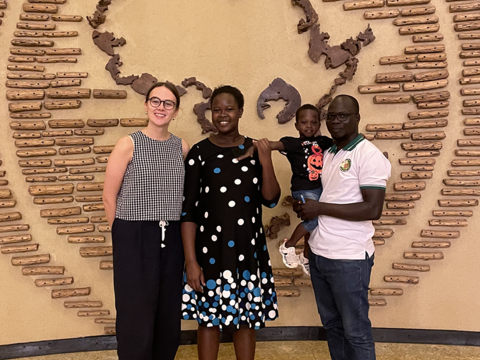Balancing family life with research

Balancing family responsibilities with active research careers is both demanding and rewarding, share two of our Early Career Grant awardees.
At a recent conference held in Uganda, RSTMH’s Grant Manager, Greta Holmes, was introduced to Irene Atii, who had recently been funded with an RSTMH Early Career Grant. From there, Greta was introduced to Walter Okello, Irene’s husband and another global health scientist who had been awarded an Early Career Grant the previous year.
As our only married grant awardees (as far as we are aware), we caught up with Walter and Irene to hear more about their research specialisms and how they balance their family life with busy work lives.
“This unique partnership has allowed us to combine our strengths, stay motivated during challenging phases of our activities, and celebrate progress together. We are grateful to RSTMH for believing in our ideas and supporting our work,” says Irene.
Addressing food safety issues in Uganda
Walter started his research career as a Research Technician at the International Institute of Tropical Agriculture (IITA) in 2021, looking at the development of Aflasafe.
Aflasafe is a biological product that uses nontoxigenic strains of the fungus Aspergillus flavus to competitively displace toxin-producing Aspergillus species from the soil to prevent preharvest aflatoxin contamination. Aflatoxins are well recognised as a cause of liver cancer, and are common contaminants of foods, particularly corn, groundnuts (peanuts), cotton seeds and tree nuts.
“It was during this period that I began to understand the real burden of aflatoxin contamination in the Ugandan food industry, which mainly affected the grain trade,” says Walter. “Since 2019, Uganda has had several episodes of grain rejection from its neighboring countries, such as Kenya and South Sudan, due to exceeding permissible levels of aflatoxin in grains.”
Recognising the need to contribute to solving this problem, Walter sought funding from the RSTMH Early Career Grants Program in 2023 to assess smallholder farmers’ knowledge, attitudes and practices related to aflatoxin and also train them on integrated aflatoxin management centered on the use of Aflasafe. His project was funded by the National Institute for Health and Care Research (NIHR) in collaboration with RSTMH.
“This study revealed that less than 30% of smallholder farmers in the northern region are aware of aflatoxin and its health implications and mitigation strategies. Additionally, the study also showed that although 91.1% had seen signs of fungal contamination in their crops, mainly maize and groundnuts, very few associated it with aflatoxin as a health risk,” he added.
After leaving IITA in April 2025, Walter joined Makerere University as a technician in the Food Hygiene laboratory, where he supports teaching and research in the university. He is currently undertaking his PhD research, which focuses on predictive modelling of aflatoxin contamination at the human-animal-crop interface in Uganda. His work aims to guide national food safety policy and reduce the health risks associated with aflatoxin contaminated foods in Uganda.
Eliminating leishmaniasis in East Africa
Irene Susan Atii is currently in the final year of her master's studies in International Infectious Diseases Management at Makerere University. With a strong background in Biomedical laboratory technology, her research interests lie in Neglected Tropical Diseases and Antimicrobial Resistance (AMR). She is one of the graduate students in the National Antimicrobial Resistance Surveillance in Animal Health in Uganda project funded by the UK government through the Fleming Fund Country grant 2 phase II.
In this project, Irene is genotyping and understanding the molecular mechanisms of AMR in E. coli isolated from chickens from Western Uganda. Coming from the resource-limited settings of the Karamoja region, also characterised by poor health facilities, Irene witnessed first-hand the impact of neglected tropical diseases, mainly visceral leishmaniasis (VL), on the local population. Visceral leishmaniasis (VL) is the second most deadly parasitic disease in the world after malaria and is caused by the bite of female sandflies.
Inspired by this, she developed a proposal titled ‘Investigating the persistent threats of Visceral Leishmaniasis in the Karamoja Region-Unravelling the hidden factors hindering eradication efforts’. Walter recommended the Early Career Grant programme to Irene and after submitting a successful application, she received funding for this project from the Children's Investment Funds Foundation (CIFF) in partnership with RSTMH.
Irene’s work is examining the community, environmental, and health system barriers that continue to allow LV to spread. The study seeks to generate evidence that will contribute towards achieving the WHO goal of eliminating VL in eastern Africa by 2030.
Irene recently attended the NNN conference in Kampala, where RSTMH were running a workshop for our CIFF funded grants awardees, which was arranged to coincide with the Neglected Tropical Disease NGO Network Conference (NNN). “Being part of the NNN conference was a transformative experience for me. It helped me expand my research networks, and I hope to utilise this network to obtain future research funding and collaborations. The interactions and mentorship from RSTMH team members further motivated me to continue building research that creates real societal impact,” says Irene.
Now that Walter and Irene are both based at Makerere University, they can occasionally find themselves working on the same project. “For instance, I am one of the technical members of the team coordinating the National AMR surveillance in Animal Health project at Makerere University, and Irene is a graduate student in this same project,” says Walter. “At home, we share responsibilities and support each other’s schedules, academic deadlines, and personal growth.”